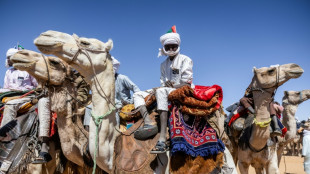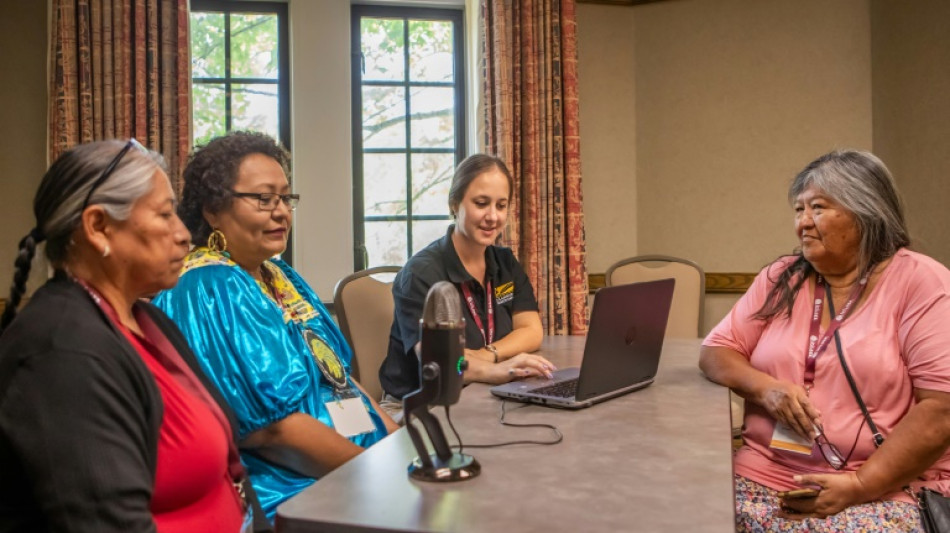
-
 Chelsea's draw with Leeds 'bitter pill' for Rosenior
Chelsea's draw with Leeds 'bitter pill' for Rosenior
-
'On autopilot': US skate star Malinin nears more Olympic gold

-
 Carrick frustrated by Man Utd's lack of sharpness in West Ham draw
Carrick frustrated by Man Utd's lack of sharpness in West Ham draw
-
Frank confident of keeping Spurs job despite Newcastle defeat

-
 James's All-NBA streak ends as Lakers rule superstar out of Spurs clash
James's All-NBA streak ends as Lakers rule superstar out of Spurs clash
-
Anti-Khamenei slogans in Tehran on eve of revolution anniversary: social media footage

-
 YouTube says it is not social media in landmark addiction trial
YouTube says it is not social media in landmark addiction trial
-
Colombian senator kidnapped, president targeted in election run-up
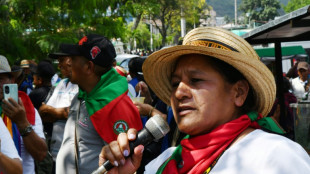
-
 Britney Spears sells rights to her music catalog: US media
Britney Spears sells rights to her music catalog: US media
-
West Ham end Man Utd's winning run, Spurs sink to 16th

-
 US skate star Malinin leads after short programme in Olympics
US skate star Malinin leads after short programme in Olympics
-
Man Utd's Sesko strikes late to rescue West Ham draw

-
 Shiffrin flops at Winter Olympics as helmet row grows
Shiffrin flops at Winter Olympics as helmet row grows
-
Celtics' Tatum practices with G League team but injury return uncertain

-
 Gisele Pelicot publishes memoirs after rape trial ordeal
Gisele Pelicot publishes memoirs after rape trial ordeal
-
Newcastle beat sorry Spurs to leave Frank on the brink

-
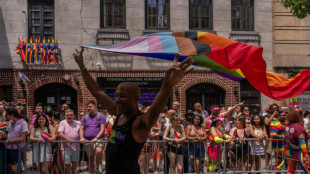 'Outrage' as LGBTQ Pride flag removed from Stonewall monument
'Outrage' as LGBTQ Pride flag removed from Stonewall monument
-
Chappell Roan leaves agency headed by embattled 2028 Olympic chief

-
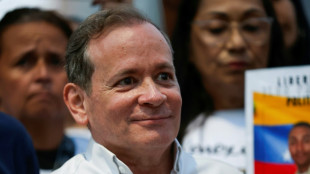 Venezuelan authorities move Machado ally to house arrest
Venezuelan authorities move Machado ally to house arrest
-
YouTube rejects addiction claims in landmark social media trial

-
 Google turns to century-long debt to build AI
Google turns to century-long debt to build AI
-
'I felt guided by them': US skater Naumov remembers parents at Olympics

-
 Till death do us bark: Brazilian state lets pets be buried with owners
Till death do us bark: Brazilian state lets pets be buried with owners
-
Ukrainian athlete vows to wear banned helmet at Winter Olympics

-
 'Confident' Pakistan ready for India blockbuster after USA win
'Confident' Pakistan ready for India blockbuster after USA win
-
Latam-GPT: a Latin American AI to combat US-centric bias
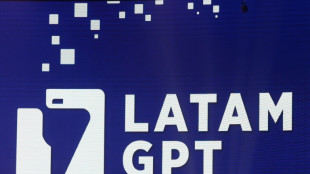
-
 Gauff dumped out of Qatar Open, Swiatek, Rybakina through
Gauff dumped out of Qatar Open, Swiatek, Rybakina through
-
Paris officers accused of beating black producer to stand trial in November

-
 Istanbul bars rock bands accused of 'satanism'
Istanbul bars rock bands accused of 'satanism'
-
Olympic bronze medal biathlete confesses affair on live TV

-
 US commerce chief admits Epstein Island lunch but denies closer ties
US commerce chief admits Epstein Island lunch but denies closer ties
-
Mayor of Ecuador's biggest city arrested for money laundering
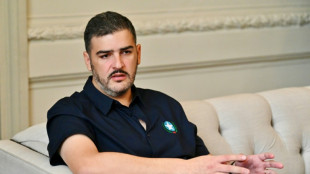
-
 Farhan, spinners lead Pakistan to easy USA win in T20 World Cup
Farhan, spinners lead Pakistan to easy USA win in T20 World Cup
-
Stocks mixed as muted US retail sales spur caution

-
 Macron wants more EU joint borrowing: Could it happen?
Macron wants more EU joint borrowing: Could it happen?
-
Shiffrin flops at Winter Olympics as helmet row simmers

-
 No excuses for Shiffrin after Olympic team combined flop
No excuses for Shiffrin after Olympic team combined flop
-
Starmer says UK govt 'united', pressing on amid Epstein fallout

-
 Pool on wheels brings swim lessons to rural France
Pool on wheels brings swim lessons to rural France
-
Europe's Ariane 6 to launch Amazon constellation satellites into orbit

-
 Could the digital euro get a green light in 2026?
Could the digital euro get a green light in 2026?
-
Spain's Telefonica sells Chile unit in Latin America pullout

-
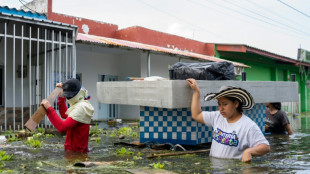 'We've lost everything': Colombia floods kill 22
'We've lost everything': Colombia floods kill 22
-
Farhan propels Pakistan to 190-9 against USA in T20 World Cup

-
 US to scrap cornerstone of climate regulation this week
US to scrap cornerstone of climate regulation this week
-
Nepal call for India, England, Australia to play in Kathmandu

-
 Stocks rise but lacklustre US retail sales spur caution
Stocks rise but lacklustre US retail sales spur caution
-
Olympic chiefs let Ukrainian athlete wear black armband at Olympics after helmet ban

-
 French ice dancers poised for Winter Olympics gold amid turmoil
French ice dancers poised for Winter Olympics gold amid turmoil
-
Norway's Ruud wins error-strewn Olympic freeski slopestyle


Tech breathes new life into endangered Native American languages
Linguistics experts are turning to cutting-edge technologies to revitalize threatened Native American languages -- and rejuvenate generations of Indigenous tradition -- through new approaches such as children's books and smartphone apps.
In one such endeavor, three Native American women rack their brains as they gather around a computer, trying to remember -- and record -- dozens of Apache language words related to everyday activities such as cooking and eating.
They are creating an online English-Apache dictionary, just one of several projects working to preserve endangered Indigenous languages in the United States.
The women are working with Rapid Word Collection (RWC) software, which uses an algorithm to search Apache text and audio databases for so-called forgotten words.
The words are then defined, translated into English, and their pronunciation recorded, so the dictionary's users will know how to say them properly.
Teacher Joycelene Johnson and two of her colleagues validate the definition of the word Apache word "kapas," which means potato in English.
"The applications in the written language are good for (a) non-speaker -- at least they'll have a museum of it where they can go to for reference," said Johnson, a 68-year-old who teaches Apache vocabulary and grammar.
According to her, the bilingual school on her reservation has about a thousand students -- but only one, an eleventh-grader, is fluent in Apache.
Johnson spoke at just one of several workshops at the International Conference on Indigenous Language Documentation, Education and Revitalization (ICILDER) last weekend at the University of Indiana.
Representatives from around 40 Indigenous groups from around the world gathered in the college town of Bloomington just days after the United States -- which counts about 6.8 million Native American residents, or about two percent of the population -- marked Indigenous People's Day.
- 4,500 languages at risk -
Linguists, teachers, students, researchers and Indigenous leaders spent the weekend brainstorming how exactly to rescue these vulnerable languages from the brink.
Of the more than 6,000 Indigenous languages recognized globally, nearly half of them are at risk of disappearing, with about 1,500 facing immediate extinction, according to a 2021 study from UNESCO.
The RWC was developed by The Language Conservancy (TLC), an NGO dedicated to protecting around 50 Indigenous languages around the world, in order to churn out such dictionaries at super-speed.
TLC, which has a $3 million budget, regularly teams up linguists with Native American language teachers to work on these dictionaries.
The software has "increased the efficiency in the workflow," said Wilhelm Meya, the CEO of TLC and one of the ICILDER organizers -- now, an Indigenous community can build a dictionary from scratch within a year, instead of 20.
"That allows us to serve languages quickly and build that infrastructure that they need to be able to survive moving forward," the 51-year old Austrian-American anthropologist explained.
- 'Crisis level' -
That speed is vital, because time is of the essence: in the United States and Canada, the last generation of native speakers are dying.
According to TLC, 143 out of 219 languages are in danger of extinction in the United States, while 75 of 94 are at similar risk in Canada.
Those are still just a small fraction of the 400 to 500 Indigenous languages that were spoken in the two countries before the arrival of Europeans and their decimation of native populations some 500 years ago.
"The situation is really at a crisis level," Meya said.
With the average age of Indigenous language speakers around 75, he added, there are only a few years left to document these languages before they disappear forever.
"Once it's gone, it's gone. You really can't bring it back very easily," said Meya, whose organization distributes their learning materials for free throughout the United States and on Native American reservations.
"When the language goes, so does the culture," he said.
Jacob Chavez, a 26-year-old Cherokee language learner who called himself a "really big supporter" of the language technology, said he appreciates how it allows communities to "record things a lot quicker and hold onto things for a lot longer than we could before."
- 'Identity' -
Paula Hawkins, who teaches the Tahltan language -- which is spoken in parts of British Columbia -- said she is "really excited" to see an online dictionary, just as her parents helped create the first Tahltan print dictionary in the 1980s.
But her colleague, 51-year-old Danielle North King, from the Chemehuevi, or Nuwuvi nation, fears that such projects impose a "Western way of writing" onto "an Indigenous way of speaking" -- the vast majority of human languages are solely oral, with no writing systems.
Indeed, Lakota Indigenous leaders denounced TLC last year, after the organization tried to copywrite teaching material that included recordings from the nation's elders.
"We don't own the copyright or the IP (intellectual property) for any of the languages we work with," Meya clarified, adding that his goal is to protect Indigenous culture.
"If we were at a hospital and I was a white doctor and I had an Indigenous patient, would I not be allowed to work on him or serve him because I'm not Indigenous?" Meya asked.
"Race can really become a hindrance to this type of work," Meya explained, when dealing with such a sensitive subject.
Language is "so fundamental to identity and to nationhood and sovereignty."
O.Farraj--SF-PST

